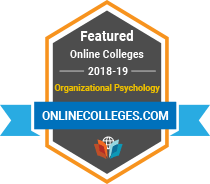Featured Online Colleges for Organizational Psychology in 2018-19
While many colleges and universities offer on-campus instruction for this field of study, online programs in organizational psychology are a rarity to come by. To make your search for the perfect school easier, we've collected this list of 10 featured schools that offer an online degree program in organizational psychology.
This list was created using data from the National Center for Education Statistics' Integrated Postsecondary Education Data System (IPEDS).
Visit our methodologies page to learn more about how we use official data to evaluate schools.
Keep reading to learn more about these featured schools, what they offer, and why they might be a good fit.
